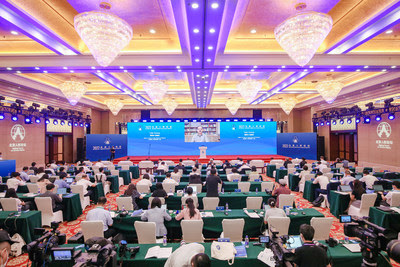بكين، 29 يوليو 2022 — / PRNewswire / سيقوم المؤتمر الوطني العشرين للحزب الشيوعي الصيني ( CPC ) -والمقرر عقده في النصف الثاني من هذا العام- بالنظر في خطة التنمية الصينية على مرحلتين في منتصف القرن الحادي والعشرين ويحدد ملامح المهام الاستراتيجية في الأعوام الخمس القادمة على وجه الخصوص.
وقد أدلى الرئيس الصيني شي جين بينغ -والذي يشغل أيضًا منصب الأمين العام للجنة المركزية للحزب الشيوعي الصيني ورئيس اللجنة العسكرية المركزية- بملاحظات في ورشة عمل لمسؤولي المقاطعات والوزراء، تم عقدها من الثلاثاء إلى الأربعاء في بكين من أجل التحضير للمؤتمر الرئيسي للحزب.
وقد رسم الحزب الشيوعي الصيني ملامح خطة تنمية على مرحلتين للفترة من عام 2020 وحتى منتصف هذا القرن في المؤتمر الوطني التاسع عشر في شهر أكتوبر 2017. ووفقًا للخطة، سيتم تحقيق التحديث الاشتراكي بشكل أساسي في الصين بحلول عام 2035، كما سيتم تطوير الصين لكي تصبح دولة اشتراكية حديثة عظمى مزدهرة، وقوية، وديمقراطية، ومتقدمة ثقافيًا، ومتناغمة، وجميلة بحلول منتصف هذا القرن.
“فصل جديد تمامًا”
وقال شي إن المؤتمر الوطني العشرين للحزب الشيوعي الصيني سيكون حدثًا هامًا للغاية يجري في لحظة حاسمة بينما تشرع الصين في رحلة جديدة من أجل بناء دولة اشتراكية حديثة بالكامل. ودعا إلى بذل الجهود من أجل تعزيز تجديد شباب الأمة الصينية وكتابة “فصل جديد تمامًا” لبناء دولة اشتراكية حديثة بالكامل.
وقال إن المؤتمر الوطني العشرين للحزب الشيوعي الصيني سيتخذ ترتيبات بشأن المهام الاستراتيجية للدولة والإجراءات الهامة التي ينبغي اتخاذها في الأعوام الخمس المقبلة، مضيفًا أن الفترة تُعَد بمثابة فترة حاسمة لتحقيق هدف المئوية الثانية للحزب.
وقال إنه ينبغي بذل المزيد من الجهود من أجل حل المشاكل من حيث “التنمية الغير متوازنة والغير كافية” في الأعوام الخمس المقبلة.
وقد حدد الحزب الشيوعي الصيني هدفين مئويين: الأول هو بناء مجتمع مزدهر إلى حد ما من جميع النواحي بحلول عام 2021 عندما احتفل الحزب الشيوعي الصيني بذكراه المئوية، والثاني هو بناء الصين لكي تصبح دولة اشتراكية حديثة عظمى من جميع النواحي بحلول منتصف هذا القرن من أجل الاحتفال بالذكرى المئوية لجمهورية الصين الشعبية.
وقال شي، إن العالم يمر بتغييرات جذرية لم نشهدها منذ قرن من الزمان، والتي تسارعت وتيرتها، مشددًا على أن الصين تواجه مخاطر وتحديات أكثر تعقيدًا من ذي قبل.
وقال إن تجديد شباب الأمة الصينية ليس بالمهمة السهلة، داعيًا إلى بذل المزيد من الجهود المضنية من أجل تحقيق الهدف.
كما شدد أيضًا على عدم وجود نموذج ثابت للتحديث في العالم، وأكد على قيادة الحزب الشيوعي الصيني لحملة التحديث الاشتراكية في الصين.
وقال إنه في الرحلة المقبلة، يجب على الحزب التمسك بهدفه الأساسي المتمثل في خدمة قلوب وأرواح الناس والحفاظ على علاقات وثيقة مع الناس بصورة دائمة.
إنجازات “فوق العادة” منذ العام 2017
استعرض شي تطور الصين منذ المؤتمر الوطني التاسع عشر للحزب الشيوعي الصيني، مشيدًا بالأعوام الخمس الماضية على أنها “فوق العادة”. وقال إن الحزب قد اتحد وقاد الشعب الصيني إلى معالجة الوضع الدولي “الخطير والمعقد” و”المخاطر والتحديات الهائلة” التي تأتي واحدة تلو الأخرى على نحو فعال.
وقال إن الصين قد سعت جاهدة من أجل المضي قدمًا في بناء مجتمع مزدهر إلى حد ما من جميع النواحي، وتعزيز التنمية عالية الجودة، وتعميق الإصلاحات بوتيرة سريعة وثابتة، ومكافحة الفقر.
وقد أعلنت الصين انتصارها في القضاء على الفقر المدقع على الصعيد الوطني بنهاية عام 2020. كما أعلنت عن اكتمال بناء مجتمع مزدهر إلى حد ما من جميع النواحي.
وقال شي، خلال الأعوام الخمس الماضية، بذلت الصين جهودًا كبيرة من أجل تعزيز الحضارة البيئية، وحماية الأمن القومي بحزم، وتحديث الدفاع الوطني والعسكري، والنهوض بدبلوماسية الدول الكبرى ذات الخصائص الصينية.
وقال إن الصين قد اتبعت نهج الناس أولاً في مكافحة وباء كوفيد-19، كما بذلت قصارى جهدها من أجل حماية حياة وصحة الناس. وأضاف أن الصين قد حققت أفضل نتيجة على مستوى العالم فيما يتعلق بتنسيق التنمية الاقتصادية، والوقاية من الأوبئة ومكافحتها.
وقال إن الصين أثناء مواجهتها لـ “تغييرات جذرية” في الوضع الدولي، قد سعت جاهدة إلى الحفاظ على كرامتها ومصالحها الأساسية.
كما أكد أيضًا على الجهود المبذولة في حملة مكافحة الفساد التي تهدف إلى ضمان أن المسؤولين “ليس لديهم الجرأة، أو الفرصة، أو الرغبة في الانخراط في الفساد”.
ويتم عقد المؤتمر الوطني للحزب الشيوعي الصيني كل خمس أعوام من أجل تحديد أهداف السياسة الوطنية للحزب وانتخاب قيادته العليا.



